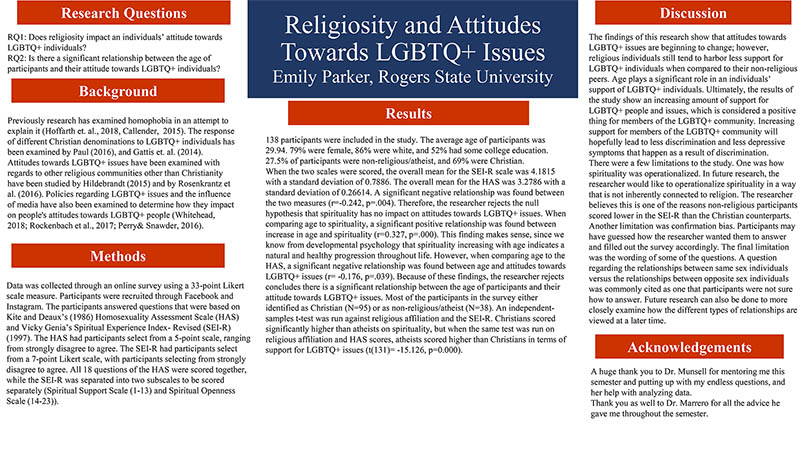
Hover to pan and click to magnify. Click again to pan at full screen.
Emily Parker, Dept. of Psychology and Sociology, Rogers State University, Claremore, OK. Faculty Advisor, Dr. Sonya Munsell, Rogers State University, Claremore, OK.
Emily Parker, Dept. of Psychology and Sociology, Rogers State University, Claremore, OK. Faculty Advisor, Dr. Sonya Munsell, Rogers State University, Claremore, OK.
ABSTRACT
Spiritual and religious beliefs may impact individuals’ feelings regarding the LGBTQ+ community. Until 2015, same sex marriage was not legal in the US. After legalization, there was backlash from many religious communities regarding this court ruling. Because much of the mid-western US is located within the “Bible Belt”, individuals from this area may harbor negative attitudes towards LGBTQ+ issues as a function of their religious beliefs. However, growing numbers of religious individuals, primarily younger individuals, are LGBTQ+ community allies. Based on this information, the researcher hypothesizes that younger participants may hold more positive attitudes towards LGBTQ+ issues than older participants. Additionally, the researcher hypothesizes a positive relationship between degree of spirituality and positive attitudes toward the LGBTQ+ community. 50 participants, recruited through Facebook and Instagram, responded to items from two dimensions (spiritual support and spiritual openness) of Genia’s (1997) Spiritual Experience Index- Revised. Kite and Deaux's (1986) Homosexuality Assessment Scale was adapted to measure attitudes toward LGBTQ+ issues. The majority of participants (84%) were between the ages of 18-24. 74.5% were female; 86% were White; and 66% had some college experience. A significant, positive correlation between age and positive attitudes toward LGBTQ+ issues (r= .383, p= .006) was found, indicating views toward LGBTQ+ issues become more positive over time. However, these results should be considered with skepticism due to the fact that the overwhelming majority of the sample was under 25 years of age. Findings revealed individuals identifying as atheists or non-religious (44%) held more negative views related to LGBTQ+ issues than their Christian (54%) counterparts: t(47)= -5.8, p= .000. Finally, there was a significant correlation (r= .82, p= .000) between positive views related to LGBTQ+ issues and spiritual support and a moderate correlation (r= .344, p= .024) between positive views of LGBTQ+ issues and spiritual openness. Results indicate that times may be changing and that religious individuals may be becoming increasingly supportive of the LGBTQ+ community.

DISQUS COMMENTS WILL BE SHOWN ONLY WHEN YOUR SITE IS ONLINE